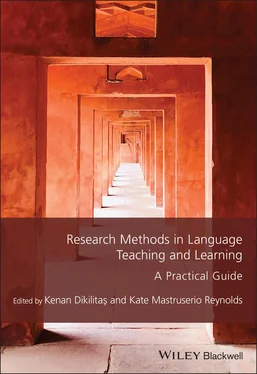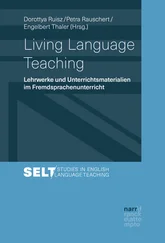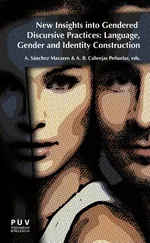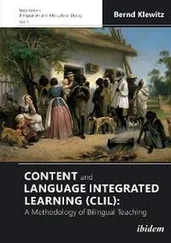Research Methods in Language Teaching and Learning
Здесь есть возможность читать онлайн «Research Methods in Language Teaching and Learning» — ознакомительный отрывок электронной книги совершенно бесплатно, а после прочтения отрывка купить полную версию. В некоторых случаях можно слушать аудио, скачать через торрент в формате fb2 и присутствует краткое содержание. Жанр: unrecognised, на английском языке. Описание произведения, (предисловие) а так же отзывы посетителей доступны на портале библиотеки ЛибКат.
- Название:Research Methods in Language Teaching and Learning
- Автор:
- Жанр:
- Год:неизвестен
- ISBN:нет данных
- Рейтинг книги:5 / 5. Голосов: 1
-
Избранное:Добавить в избранное
- Отзывы:
-
Ваша оценка:
- 100
- 1
- 2
- 3
- 4
- 5
Research Methods in Language Teaching and Learning: краткое содержание, описание и аннотация
Предлагаем к чтению аннотацию, описание, краткое содержание или предисловие (зависит от того, что написал сам автор книги «Research Methods in Language Teaching and Learning»). Если вы не нашли необходимую информацию о книге — напишите в комментариях, мы постараемся отыскать её.
Research Methods in Language Teaching and Learning
Research Methods in Language Teaching and Learning
Research Methods in Language Teaching and Learning — читать онлайн ознакомительный отрывок
Ниже представлен текст книги, разбитый по страницам. Система сохранения места последней прочитанной страницы, позволяет с удобством читать онлайн бесплатно книгу «Research Methods in Language Teaching and Learning», без необходимости каждый раз заново искать на чём Вы остановились. Поставьте закладку, и сможете в любой момент перейти на страницу, на которой закончили чтение.
Интервал:
Закладка:
Diaries therefore seemed well suited to my ethnographic investigation of a particular language classroom. They offered participants the opportunity to record introspective reflections on their own experiences (Bailey, 1983), through which I could start to uncover the social and psychological processes operating within the classroom – a “unique situated reality” embedded within layers of context (Blommaert & Jie, 2010, p. 17). I hoped that the diaries could capture the hard-to-reach thoughts and “little experiences” of everyday life in the classroom that occupy much of teachers’ and learners’ conscious attention (Wheeler & Reis, 1991, p. 340, cited in Bolger et al., 2003), enabling me to discover and examine reported experiences in their natural and (almost) spontaneous context; by reducing the amount of time between an experience and the recording of that experience, using diaries was likely to significantly reduce the extent of recall error or bias compared to approaches such as interviews (Alaszewski, 2006; Bolger et al., 2003). And they could reveal the complexity of classroom life by prioritizing the participants’ experiences and beliefs, drawing upon their “emic” (Richards et al., 2012) perspectives on events and contexts (i.e., participants’ own “insider” understandings). Central to my use of diaries was the aim of providing participants with more “voice” within the study, compared to other research tools and data sources, while I would move from a position of “ignorance” at the start of a study to become a “knower” through a process of diary data collection and analysis (Blommaert & Jie, 2010). The diary study was thus intended to provide me with a means of unpacking what is often taken for granted in the classroom, those “common sense” assumptions about teaching and learning that I wanted to move beyond (see Introduction).
However, beyond this broad understanding of how the use of ethnographic diaries would develop my understanding of the classroom, there remained a range of questions concerning the practicalities of diary design and implementation, while the subsequent analysis of data also raised a number of dilemmas; as Janssens et al. (2018, p. 1) acknowledge, there is “no golden standard for the optimal design of a diary study.” Moreover, within applied linguistics research and, more specifically, within research into language teaching and learning, diaries are often undervalued or overlooked as a possible means of collecting data (Rose et al., 2020); 1there were thus few methodological models for me to follow within the research literature. Like all diary-oriented researchers, therefore, I faced a series of choices when designing my approach. Decisions would need to reflect both the aims of my project and also take into account any practical constraints on the research (e.g., the need to find both willing and appropriate – i.e., potentially informative – participants; maintaining their participation over the course of the study; acknowledging and accommodating any time constraints they may be under). However, my choices would also affect the quality, integrity, and interpretability of the project’s data.
It is to the process of finding participants that the discussion now turns, subsequently moving on to examine the methodological choices underpinning the design of the diaries themselves, as these decisions were in part shaped by the participants’ perspectives and related practicalities.
Finding Participants: Access, Ethics, and Consent
By drawing on participants’ own understandings and perspectives, ethnographic diaries are essentially an exploratory form of research (Bailey, 1991) which, as we have seen, aim to add depth, detail, and realism to existing conceptualizations of language teaching, learning, and classroom life. Additionally, through the researcher’s interpretation of the diary data, they can be used to generate new hypotheses (ibid.) or open up new lines of enquiry (Halbach, 2000). Thus, as Bailey (1991, p. 83) notes, “generalizability is neither the purpose nor the point of diary studies.” Rather, the objective is to understand phenomena – in the case of my own study, a particular language classroom – from the participants’ point of view, although any insights which emerge may, of course, have some relevance to, or prompt reflection about, other apparently similar contexts. Obviously, therefore, for a diary study to be successful, participants need to be comfortable with the aims and approach of the research, and given that they are being asked to reveal their thoughts and feelings, belief and trust in the researcher is a central concern.
Hence in my project, research design, finding a class who could and would participate in the research, and building trust between myself and these participants were simultaneous, overlapping, and ongoing processes rather than individual events. I negotiated “site entry” (Erikson, 1986) with a proposed format in mind for both the diary and other elements of the broader ethnographic methodology (see above), but also hoped participants would actively help shape the research design, subsequently fine-tuning my approach in line with the circumstances (both physical and social) and recommendations of the teacher and learners (adjusting, for instance, the diary guidelines offered to participants [see below], the time demands placed on them, and so forth).
Ethical considerations were also, of course, central to these processes. Given the project’s focus on “the social classroom” and possible differences between participants’ perspectives of classroom life and events, I had initially speculated that a class with social “difficulties,” where the smooth flow of classroom interaction might break down for whatever reason, might provide more “interesting” data; the “gap” noted in Block’s (1996) diary study, for example, was between a teacher and a rather critical student, Block’s data suggesting that (some) learners like to know the rationale for classroom activities in addition to how to complete them. And yet, to actively search for a class in which social difficulties were prevalent seemed problematic, and explicitly asking participants to focus on tensions and problems seemed to pose unacceptable social and psychological risks to them (see also, Erikson, 1986). I felt that verbalizing, through a diary, previously unspoken thoughts may reify any negative attitudes the diarists might have, causing a degree of emotional harm, and potentially eroding further classroom relationships, with myself as researcher unable to intervene for reasons which included my lack of training in counselling, insufficient class knowledge, and the potential impact of any intervention on classroom life and the project’s data in contravention of the project’s ethnographic principles.
It therefore seemed important to work with a class whose members liked or interacted positively with each other. Clearly, however, these concepts are difficult to pin down precisely and play out in ways that are changeable and at times difficult to ascertain. Consequently, I relied on the professional expertise of a former colleague (and friend) who suggested that his class in a UK-based private language school might provide an appropriate focus for the research. Yet as the discussion above suggests, the benefits to participants of taking part in a research project are often not clear or straightforward, and participation may not even be in their best interests (Erikson, 1986), particularly, for example, in my diary study, given its likely time demands and its possible inherent social and psychological risks. Thus, for both ethical and practical purposes, my research needed the participants’ informed consent, not only that given at the outset of the project, but as an on-going process throughout the study built on trust and negotiation between myself as researcher and the teacher and learners.
Читать дальшеИнтервал:
Закладка:
Похожие книги на «Research Methods in Language Teaching and Learning»
Представляем Вашему вниманию похожие книги на «Research Methods in Language Teaching and Learning» списком для выбора. Мы отобрали схожую по названию и смыслу литературу в надежде предоставить читателям больше вариантов отыскать новые, интересные, ещё непрочитанные произведения.
Обсуждение, отзывы о книге «Research Methods in Language Teaching and Learning» и просто собственные мнения читателей. Оставьте ваши комментарии, напишите, что Вы думаете о произведении, его смысле или главных героях. Укажите что конкретно понравилось, а что нет, и почему Вы так считаете.












